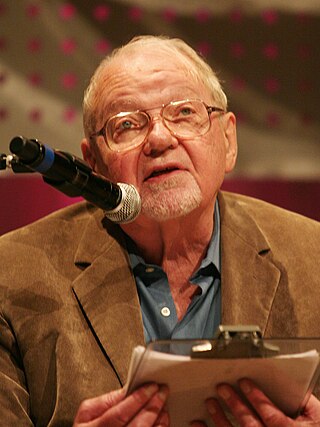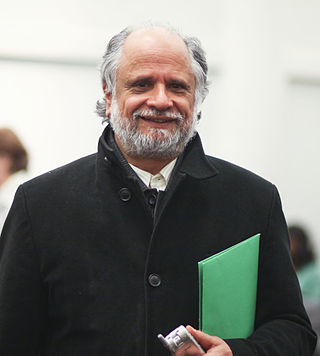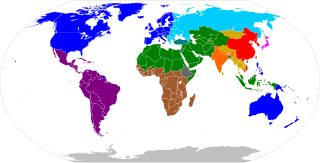
Postmodernism is a term used to refer to a variety of artistic, cultural, and philosophical movements that claim to mark a break from modernism. They have in common the conviction that it is no longer possible to rely upon previous ways of representing reality. Still, there is disagreement among experts about its more precise meaning even within narrow contexts.

The Sandinista National Liberation Front is a Christian socialist political party in Nicaragua. Its members are called Sandinistas in both English and Spanish. The party is named after Augusto César Sandino, who led the Nicaraguan resistance against the United States occupation of Nicaragua in the 1930s.

Discourse is a generalization of the notion of a conversation to any form of communication. Discourse is a major topic in social theory, with work spanning fields such as sociology, anthropology, continental philosophy, and discourse analysis. Following pioneering work by Michel Foucault, these fields view discourse as a system of thought, knowledge, or communication that constructs our world experience. Since control of discourse amounts to control of how the world is perceived, social theory often studies discourse as a window into power. Within theoretical linguistics, discourse is understood more narrowly as linguistic information exchange and was one of the major motivations for the framework of dynamic semantics. In these expressions, ' denotations are equated with their ability to update a discourse context.

Rigoberta Menchú Tum is a K'iche' Guatemalan human rights activist, feminist, and Nobel Peace Prize laureate. Menchú has dedicated her life to publicizing the rights of Guatemala's Indigenous peoples during and after the Guatemalan Civil War (1960–1996), and to promoting Indigenous rights internationally.

Fredric Ruff Jameson was an American literary critic, philosopher and Marxist political theorist. He was best known for his analysis of contemporary cultural trends, particularly his analysis of postmodernity and capitalism. Jameson's best-known books include Postmodernism, or, The Cultural Logic of Late Capitalism (1991) and The Political Unconscious (1981).

Homi Kharshedji Bhabha is an Indian scholar and critical theorist. He is the Anne F. Rothenberg Professor of the Humanities at Harvard University. He is one of the most important figures in contemporary postcolonial studies, and has developed a number of the field's neologisms and key concepts, such as hybridity, mimicry, difference, and ambivalence. Such terms describe ways in which colonised people have resisted the power of the coloniser, according to Bhabha's theory. In 2012, he received the Padma Bhushan award in the field of literature and education from the Indian government. He is married to attorney and Harvard lecturer Jacqueline Bhabha, and they have three children.

Other is a term used to define another person or people as separate from oneself. In phenomenology, the terms the Other and the Constitutive Other distinguish other people from the Self, as a cumulative, constituting factor in the self-image of a person; as acknowledgement of being real; hence, the Other is dissimilar to and the opposite of the Self, of Us, and of the Same. The Constitutive Other is the relation between the personality and the person (body) of a human being; the relation of essential and superficial characteristics of personal identity that corresponds to the relationship between opposite, but correlative, characteristics of the Self, because the difference is inner-difference, within the Self.
The Subaltern Studies Group (SSG) or Subaltern Studies Collective is a group of South Asian scholars interested in postcolonial and post-imperial societies. The term Subaltern Studies is sometimes also applied more broadly to others who share many of their views and they are often considered to be "exemplary of postcolonial studies" and as one of the most influential movements in the field. Their anti-essentialist approach is one of history from below, focused more on what happens among the masses at the base levels of society than among the elite.
Latino studies is an academic discipline which studies the experience of people of Latin American ancestry in the United States. Closely related to other ethnic studies disciplines such as African-American studies, Asian American studies, and Native American studies, Latino studies critically examines the history, culture, politics, issues, sociology, spirituality (Indigenous) and experiences of Latino people. Drawing from numerous disciplines such as sociology, history, literature, political science, religious studies and gender studies, Latino studies scholars consider a variety of perspectives and employ diverse analytical tools in their work.

In postcolonial studies and in critical theory, subalterns are the colonial populations who are socially, politically, and geographically excluded from the hierarchy of power of an imperial colony and from the metropolitan homeland of an empire. Antonio Gramsci coined the term subaltern to identify the cultural hegemony that excludes and displaces specific people and social groups from the socio-economic institutions of society, in order to deny their agency and voices in colonial politics. The terms subaltern and subaltern studies entered the vocabulary of post-colonial studies through the works of the Subaltern Studies Group of historians who explored the political-actor role of the common people who constitute the mass population, rather than re-explore the political-actor roles of the social and economic elites in the history of India.
Robert Stam is an American film theorist working on film semiotics. He is a professor at New York University, where he teaches about the French New Wave filmmakers. Stam has published widely on French literature, comparative literature, and on film topics such as film history and film theory. Together with Ella Shohat, he co-authored Unthinking Eurocentrism: Multiculturalism and the Media.
Posthegemony or post-hegemony is a period or a situation in which hegemony is no longer said to function as the organizing principle of a national or post-national social order, or of the relationships between and amongst nation states within the global order. The concept has different meanings within the fields of political theory, cultural studies, and international relations.
Latin American subaltern studies was a group founded in 1992 by John Beverley and Ileana Rodríguez. Inspired by the South Asian Subaltern Studies group, its aim was to apply a similar perspective to Latin American studies. It was one of the more important recent developments within Latin American cultural studies, though in the end the group folded owing to internal differences that were both scholarly and political.
Third World socialism is an umbrella term for many movements and governments of the 20th century— all variants of socialism— that have taken place in numerous less-developed countries. There have been many leaders of this practice and political philosophy which remained strong until at least the 1990s, including: Michel Aflaq, Salah al-Din al-Bitar, Zulfikar Ali Bhutto, Buddhadasa, Fidel Castro, Muammar Gaddafi, Saddam Hussein, Juan Domingo Perón, Modibo Keïta, Walter Lini, Gamal Abdel Nasser, Jawaharlal Nehru, Kwame Nkrumah, Julius Nyerere, Sukarno, Ahmed Sékou Touré and other socialist leaders of the Third World who saw socialism as the answer to a strong and developed nation.
Postcolonialism is the critical academic study of the cultural, political and economic consequences of colonialism and imperialism, focusing on the impact of human control and exploitation of colonized people and their lands. The field started to emerge in the 1960s, as scholars from previously colonized countries began publishing on the lingering effects of colonialism, developing a critical theory analysis of the history, culture, literature, and discourse of imperial power.

Anti-Western sentiment, also known as anti-Atlanticism or Westernophobia, refers to broad opposition, bias, or hostility towards the people, culture, or policies of the Western world.
Tom Brass is an academic who has written widely on peasant studies. For many years he was at the University of Cambridge as an affiliated lecturer in their Faculty of Social and Political Sciences and at Queens' College, Cambridge as their Director of Studies of the Social and Political Sciences. For many years he was an, and then the, editor of the Journal of Peasant Studies. Murray reports Brass as being "dismissive of the cultural turn in peasant studies" and the rise of post-modern perspectives and his notion that this has been a conservative process and that it has lent support to neoliberalism.
Juan Poblete is Professor of Latin American Literature and Cultural Studies at the University of California, Santa Cruz. Poblete began his career as a UCSC Assistant Professor in 1997. He is also the provost of Kresge College at UCSC and a Governing Board Member of the Latino Literary Cultures Project/Proyecto Culturas Literarias Latinas.

Franco Laguna Correa was born in Mexico City. He is a writer, ethnographer, and musician/composer, also known for his heteronyms "Dr. Crank," "Crank," "Sardine," "f.l Crank," "Gaetano Fonseca" and "Mehmet Amazigh." He has been included by literary critics in the so-called New Latino Boom, which is a literary movement that features 21st-century Latin American fiction authors writing in Spanish in the United States. He has contributted to the Oxford Research Encyclopedia of Literature (ORE) with the essay "Brown/Brownness/Mestizaje".

Ileana Rodríguez is Distinguished Professor Emeritus in Latin American Literatures and Cultures at the Ohio State University, and she is also affiliated with the Instituto de Historia de Nicaragua y Centroamérica (IHNCA).










